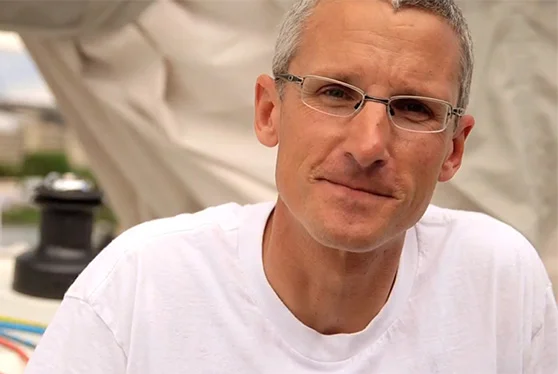As we write this, there are less than 12 days until the start of the 2014 Atlantic Cup--the preeminent event in the United States for short-handed sailors, as we described in our last post profiling Chad Corning and his tips on how not to flunk Offshore 101. Here, we focus on another Atlantic Cupper and local Long Island sailor, Rob Windsor, who will be racing with Mike Hennessy aboard Team Dragon.
Hailing from Centerport, New York, Rob started sailing at the ripe age of two, and has since developed a keen interest in short-handed Class 40 ocean racing. Rob has sailed in all three iterations of the Atlantic Cup, twice aboard Team Dragon. He's made six Atlantic crossings, including aboard Team Dragon, which finished only 30 minutes behind Concise2 to come in 2nd in the double-handed class in the 2011 NYYC Transatlantic Race. In 2013, Rob finished the 5,450 nm course from Le Havre, France, to Itajai, Brazil, as part of the prestigious Transat Jacques Vabre, which attracts some of the world's best ocean racers including Franck Cammas and Jean-Pierre Dick. Rob sailed with teammate Hannah Jenner aboard the Class 40 11th Hour Racing, and persevered despite suffering a rig failure early in the race that sent them backwards to Brest for repairs.
Rob's extensive mileage as a short-handed offshore sailor, and experience dealing with complications at sea, make him a valuable resource for our program. When we reached out to Rob to give us his thoughts on offshore racing, including any rules that he lives by, he quickly pointed out that when it comes to sailing short-handed offshore, there are few rules--the top one on his list being not to fall off the boat. This is one rule that I will need to explain to Jimmy--my alternate personality that manifests during my hypnagogic state of consciousness. He's a mischievous fellow that likes to wreak havoc on my wife principally by speaking gibberish: "Where are the documents for Elsa's deposition tomorrow in Arendelle!?" he might yell. Although he is responsible for doing some pretty horrible things without my knowledge, like climbing into bed (under the top sheet!) without showering after an all-nighter at work, I'm fairly certain he won't cause us to fall off the boat. That said, I'm clipping in while I sleep solo offshore in an effort to heed Rob's number one rule for short-handed offshore racing.
Rob provides his other rules below. Follow Rob here as he vies for the title in the 2014 Atlantic Cup aboard Team Dragon. The first leg from Charleston, South Carolina, to New York, New York, starts on May 10, which is the same day we'll be racing against two other Mini 6.50s in the 59th Larchmont YC Edlu Race.
Rob Windsor Profile
Team Dragon (Mike Hennessy, Rob Windsor) recap from the Atlantic Cup 2011.
Nationality - USA
Occupation - North American Agent for Owen Clarke Yacht Design, yacht preparateur
Disciplines - short-handed ocean racing, Class 40
Teams - Dragon, 11th Hour Racing
Notable Results
8th, 2013 Fastnet, 11th Hour Racing
2nd, 2011 NYYC Transatlantic Race, Dragon
2nd, 2011 Atlantic Cup, Dragon (first in leg from Charleston to New York)
Short-Handed Offshore Racing: Rob's Rules
Stay on the boat!!!
I have very few rules when sailing offshore but at the top of the list is DONT FALL OFF. If you fall overboard during a race where you are by yourself, or double handed, there is a very good chance that you will die. I can't think of a scarier scenario than coming on deck for my watch and finding my co-skipper not there. You have a harness for a reason--use it and clip in.
Don't take anything for granted.
It goes without saying, but preparation is key to success in anything--especially sailboat racing. Going over the boat from stem to stern and from keel to masthead is super important. I can tell you from experience that having a big failure is not fun. You need to check the boat over thoroughly--including parts and jobs done by others. If you assume that all is well, it never is.
Work at not being a crappy sailor.
This goes along with my point on preparation but I thought I would give it its own line. You can't be great at anything without practice. You think those guys you see on TV playing professional sports making millions just show up? Nope. They have to work at it, same as everyone else.
Practice will get you in a position where you know what to do when the time comes. You will know what settings make your boat fast. You will know the best way to get the spinnaker down in big breeze. There is no end to the benefit of training. Don't just go sailing on a beautiful day. Go out when it's windy or raining. Go out when there is no wind. Having some time dealing with the not so nice will save you tons of time on the race course.
Covet thy auto pilot.
People get weird about the way they think about their auto pilot. I believe that you need to treat it like a person. Let's face it, you can't steer the whole way if you are only one or two on the boat. The pilot will do a lot of the driving. If you were trimming the main for a person driving, they would tell you that they had too much or too little helm. The pilot can't talk but it does let you know what's going on by the way it drives. You need to pretend that there is a person sitting there with the tiller in their hand to get the most out of it. If you are nice to the driver, you will do much better at the end.
Go to sleep.
You have to sleep. Getting into a routine is hard for some people. Most people are not used to getting 2 hours sleep and then going back to work for 2 hours. However you set up your watch system on board, it is important that you get enough rest. When you are tired, you make silly mistakes that can cost you a race. Making a mistake while you are tired can also get people hurt which takes the fun out of it. While you are on watch, you are responsible for keeping the boat moving as fast as possible as well as keeping the other person on board safe. It is a lot of responsibility. Make sure that you get the rest you need to be responsible for your self, the boat, and your co-skipper.
Keep the wheels on the bus.
You need to keep the boat moving all the time. Wiping out because you have too much sail up is not fast. It's also real easy to break stuff. If you spend some time not "taking things for granted" and working on "not being a crappy sailor," you'll see that decreasing sail area is faster than leaving the big stuff up in too much breeze. Reefs go in and out pretty easily and fairly quickly as well. If you blow up your big kite because you left it up in a squall you will be very disappointed when you need it again. Be smart, and reef early and often.
Don' get HANGRY.
You need energy to compete. You need to have the right kinds of food aboard to keep your energy level up. Some of the freeze dried foods are pretty good I think. They make a lot of different varieties with lots of different ingredients. You also need to have some happy food. Having a snack like chocolate or nuts that makes you feel good mentally will go a long way. For me, coffee is the key. I can't make it without at least one cup per shift. Whatever your happy food is, bring enough so you don't run out.
Love all, trust a few...
It is really important that you work as a team and have a co-skipper that you can trust. Once you find that person, look after them. There is no one else looking out for your well-being, so it's important. So if your co-skipper is a coffee drinker, make them a cup before they come on watch. It takes two minutes and may sound like a small thing, but it shows that you are looking out for them.
Have good spares. Know how to fix stuff.
No matter how well you prepare, stuff will break. You can't have a spare for everything so you need to make a good list and pick the things you can't live without. All of that depends on the boat you are on so it will take some time. You need to know your boat's systems and how to fix each of them. The sailing bits are fairly straight forward. Winches, furling gear, etc. is standard stuff you should know. Electronics is a big one that bites a lot of people. Knowing where the wires are and what they do can be a huge help when things break down. The more time you spend fixing things means less time making the boat go fast. Figure out what you're good at and figure learn about what you not good at. Take the time to learn.
The race isn't over until you cross the finish line. There will be some ups and downs. If you let the downs keep you down, you're done. Positive mental attitude is key. It's hard to keep it up but that's how you win. Quitters never win and winners never quit. Lots of cliches in there but they are all true.
Never give up.
The Abilyn Racing Ocean Racer Series collects tips and experiences from some of the world's most accomplished ocean racers. Our goal is to improve our own sailing, as well as to show other sailors--both in the United States and elsewhere--that if you have strong ambitions to race offshore, there is a network out there of knowledge and guidance. Just ask!













